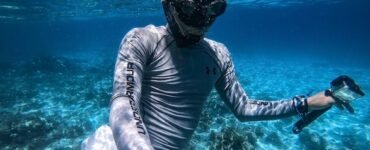Breath-hold diving is a fundamental skill for spearfishing enthusiasts allowing them to explore the underwater world and extend their dive times without relying on scuba gear. By mastering proper breath-holding techniques you can enhance your spearfishing experience and increase your chances of success. In this article we will discuss essential tips for improving your breath-holding abilities and achieving extended dive times.
1. Relaxation and Mental Preparation
Before attempting a breath-hold dive it’s essential to relax your mind and body. Find a calm and comfortable spot where you can focus on your breathing. Practice relaxation techniques such as deep breathing meditation and visualization to alleviate stress and anxiety. Mental preparation plays a significant role in improving breath-holding capabilities.
2. Diaphragmatic Breathing
Diaphragmatic breathing also known as belly breathing or deep breathing is a technique that maximizes oxygen intake and relaxation. Instead of shallow chest breathing focus on expanding your diaphragm and filling your lungs fully. Breathe in deeply through your nose allowing your abdomen to rise and exhale slowly through your mouth. Practice this breathing technique regularly to increase your lung capacity and improve breath control.
3. Pre-Dive Breath-Up
A pre-dive breath-up is a series of deep breaths taken before a breath-hold dive to saturate your body with oxygen. Start by taking several deep breaths filling your lungs completely and then exhaling slowly. This process helps oxygenate your blood and prepares your body for the upcoming dive. Combine the pre-dive breath-up with relaxation techniques to enter a calm and focused state before diving.
4. Frenzel Technique
The Frenzel technique is a method of equalizing your ears while descending during a breath-hold dive. It involves closing your vocal cords and using the muscles in the back of your throat to push air into your middle ear. By mastering this technique you can equalize your ears without needing to swallow or pinch your nose. Proper equalization prevents discomfort and potential ear injuries during deep dives.
5. CO2 Tolerance Training
Carbon dioxide (CO2) build-up is one of the main challenges during breath-hold dives. CO2 accumulation triggers the urge to breathe leading to premature resurfacing. CO2 tolerance training involves gradually exposing yourself to increased CO2 levels through controlled breath-hold exercises. Start with short breath-holds and gradually extend the duration over time. This training helps your body adapt to higher CO2 levels allowing for longer breath-hold times.
6. Mental Distraction Techniques
Distracting your mind during a breath-hold can help extend your dive time. Engage in mental activities such as counting reciting songs or poems visualizing your surroundings or focusing on specific objects underwater. By diverting your attention from the urge to breathe you can push your limits and achieve longer breath-hold durations.
7. Physical Fitness and Stamina
Maintaining good physical fitness is essential for breath-hold diving. Regular cardiovascular exercises such as swimming running or cycling improve your lung capacity and overall stamina. Strengthening your core muscles through exercises like planks and yoga can also contribute to better breath control and stability while diving.
8. Progressive Training
Improving your breath-holding abilities takes time and consistent practice. Start with shorter breath-hold durations and gradually increase them as your body adapts. Focus on quality rather than quantity ensuring that your dives are comfortable and safe. Be patient and persistent and over time you will notice significant improvements in your breath-holding capabilities.
9. Safety Considerations
While training and pushing your limits always prioritize safety. Never practice breath-hold diving alone especially in challenging or unfamiliar conditions. Always have a buddy or dive partner nearby for assistance and safety support. Familiarize yourself with the signs and symptoms of hypoxia and listen to your body’s signals. Never push yourself beyond your comfort level or attempt breath-hold dives that exceed your training and experience.
Conclusion
Improving your breath-holding techniques is crucial for extending your dive times and maximizing your spearfishing experience. By practicing relaxation diaphragmatic breathing pre-dive breath-up equalization techniques like the Frenzel technique CO2 tolerance training mental distraction techniques and maintaining physical fitness you can enhance your breath-holding capabilities and explore the underwater world with confidence. Remember to prioritize safety at all times and enjoy the incredible moments that breath-hold diving and spearfishing have to offer.
FAQs
1. Can anyone improve their breath-holding capabilities for spearfishing?
Yes with practice and proper training anyone can improve their breath-holding capabilities. It’s important to start gradually listen to your body and progress at a pace that feels comfortable and safe for you.
2. How long does it take to see improvements in breath-holding times?
The time it takes to see improvements in breath-holding times varies from person to person. Consistent training and practice can lead to noticeable improvements within a few weeks to months. However individual progress may vary based on factors such as fitness level lung capacity and commitment to training.
3. Are there any risks associated with breath-hold diving?
Breath-hold diving poses certain risks including shallow water blackout and hypoxia. It is crucial to receive proper training practice with a buddy and follow safety guidelines to minimize the risks associated with breath-hold diving.
4. Can I use relaxation techniques during a breath-hold dive?
Yes relaxation techniques such as deep breathing and visualization can be used during a breath-hold dive to promote calmness and focus. These techniques help alleviate stress and enhance the overall diving experience.
5. Are there specific foods or diets that can improve breath-holding abilities?
While maintaining a balanced and healthy diet is beneficial for overall fitness there are no specific foods or diets that directly improve breath-holding abilities. However staying hydrated and consuming nutrient-rich foods can support optimal physical and mental performance during breath-hold diving.

Explore the mesmerizing world of spearfishing on our blog! Discover tips, techniques, and breathtaking underwater stories from passionate spearfishers. Dive in for an ocean of adventure.







